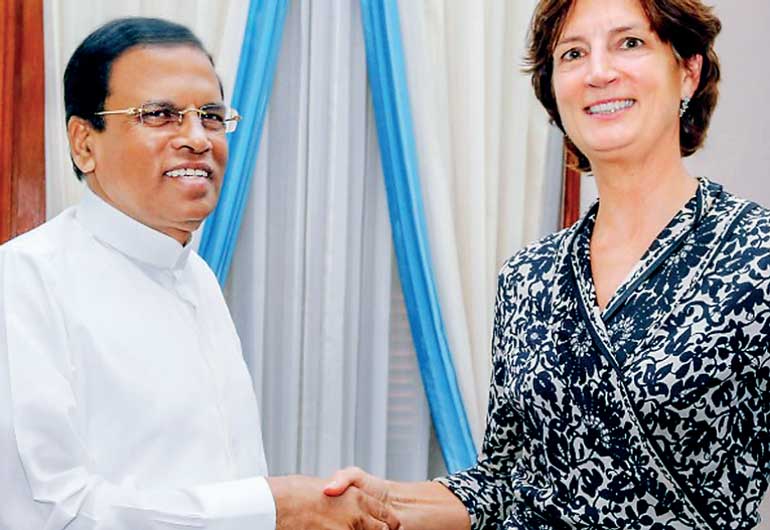Sunday Feb 22, 2026
Sunday Feb 22, 2026
Friday, 16 September 2016 00:02 - - {{hitsCtrl.values.hits}}
 Dutch Ambassador in Sri Lanka Joanne Doornewaard handed over the final report with President Maithripala Sirisena
Dutch Ambassador in Sri Lanka Joanne Doornewaard handed over the final report with President Maithripala Sirisena
The government of The Netherlands, on a special request made by the President Maithripala Sirisena, agreed to provide support to conduct research activities necessary for prevention of kidney disease in the country.
The Dutch government, responding positively to President Maithripala Sirisena’s request in July 2015 for assistance from the diplomatic community on the Chronic Kidney Disease (CKD) issue, has offered the services of the Dutch Risk Reduction (DRR) Team.
Accordingly, the government of the Netherlands has sent a Dutch Risk Reduction (DRR) team of four experts for evaluation and recommendation on the current water provision in the endemic areas of the country.
Dutch Ambassador in Sri Lanka Joanne Doornewaard handed over the final report which consist the DRR team’s findings and recommendations to President Sirisena on 13 September at the Presidential Secretariat.
The DRR team, consisting of three water experts from the Netherlands and one from Sri Lanka, conducted the mission from 3-9 April. During the mission, the team participated in a stakeholder meeting at the Presidential Secretariat, collected water samples during their field visits to the Anuradhapura and Polonnaruwa Districts and conducted a debriefing meeting for the stakeholders at the Ministry of City Planning and Water Supply, according to the Royal Dutch Embassy in Colombo.
Chronic Kidney Disease with Unknown Etiology (CKDu) is a major health problem in Sri Lanka affecting more than 15% of the population aged 15-70 years in the North Central Province, according to the World Health Organization (WHO). The disease is now also prevalent in the North Western, Eastern, Southern and Central Provinces.
The focus of the DRR mission was on risk factors related to drinking water. The team has reviewed all water-related hypotheses and could assess the accuracy of most of them using their observations and sample results.
The team found no convincing consistent statistical evidence that links the available data on drinking water quality with CKDu. They observed that the exposure of farmers to pesticides during the spraying of the fields is much larger than the exposure caused by trace amounts of pesticides in drinking water.
The DRR team observed that due to the poor taste of water from wells, the farmers do not drink sufficient water while working in the fields leading to dehydration and kidney damage. The team recommended promoting higher water intake by using Reverse Osmosis systems to provide quality drinking water to the areas affected by the disease as availability of RO treated water will expectedly result in a higher drinking water intake by the people.
An action plan has been formulated that would lead – in steps – to a safe water management in the short/long term, also considering the response of the Government to procure several hundreds of small RO (Reverse Osmosis) plants.